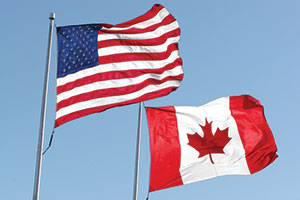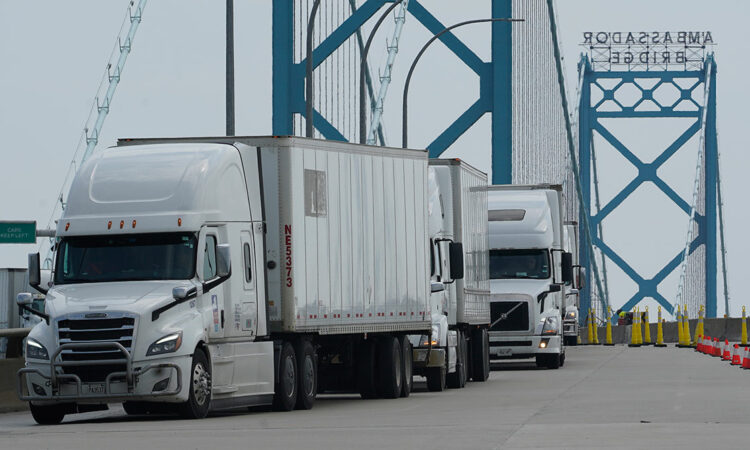The flow of freight between the United States and Canada could be slowed beginning in January, as both countries’ governments adopt more stringent COVID-19 vaccine requirements for cross-border truck traffic.
“All inbound foreign national travelers seeking to enter the United States via land points of entry or ferry terminals — whether for essential or nonessential reasons — must be fully vaccinated for COVID-19 and provide related proof of vaccination,” said a bulletin from the U.S. Department of Homeland Security. While the Oct. 29 announcement said the restrictions would be adopted in January, no date has been set.
That’s not the case in Canada; that nation’s Ministry of Health has set a Jan. 15, 2022, implementation date for a rule that states certain groups of travelers — among them essential providers including truck drivers, who are currently exempt from COVID-19 entry requirements — will be allowed to enter Canada only if they have been fully vaccinated with an approved vaccine.
“Health and safety will always remain at the forefront of any decision our government makes in the fight against COVID-19,” Canada’s Minister of Health Jean-Yves Duclos said in a Nov. 25 statement. “The upcoming changes to Canada’s border testing and entry requirements reflect the next stage in our government’s approach as we align with the improving vaccination rates both here in Canada and around the world. The situation at our borders remains closely monitored, with officials and experts continuing their work to evaluate the measures in place and recommend necessary adjustments as required.”
American Trucking Associations Chief Economist Bob Costello expressed concern about adoption of the new requirements at a time when supply chains are stretched.
“Canada had not required its domestic drivers to get vaccinated, so they are only really doing this because the U.S. government has said it will require it for their citizen-drivers,” he said. “The border situation could get really dicey for the supply chains in mid-January when all of this happens.”
The Ministry of Health said that to qualify as a fully vaccinated traveler, a person must have by at least 14 full days before the date of travel received at least two doses of an approved vaccine, a mix of the two vaccines, or at least one dose of the one-shot Johnson & Johnson vaccine. Approved vaccines include those produced by AstraZeneca, Biotech, Johnson & Johnson, Moderna, Pfizer-BioNTech, Sinopharm and Sinovac.

U.S. and Canada flags. (KKIDD/Getty Images)
Costello noted that the Canadian government is not planning to offer exemptions for truck drivers who have not received a vaccine.
“You should prepare for mid-January,” he said. “Drivers are going to have to show proof of vaccination to enter Canada. I would say this is not going to change.”
The Canadian Ministry said, “COVID-19 testing and vaccine requirements, as well as other border measures, are an important part of Canada’s response to the COVID-19 pandemic, and serve to protect the health and safety of all Canadians. With vaccination rates increasing around the world, and an evolving epidemiological situation, it is important that Canada’s border measures reflect the current global context.”
A survey of nearly 1,200 truck drivers released in November by driver recruitment firm Conversion Interactive Agency found that almost 55% of U.S. drivers had received the COVID-19 vaccination, while 36% said they had no intention of receiving it. At the time, about 9% had not received a shot but planned to do so.
“With a significant percentage of drivers having no plans for vaccination, this sets up a challenge for motor carriers depending on how vaccine mandates play out both on the federal and state level,” the report said.
A proposal from the Biden administration that would require vaccinations or regular COVID-19 testing for those working at companies with 100 or more employees is currently on hold and is being litigated at the federal appeals court level.
On Dec. 7, a federal appeals court judge in Savannah, Ga., blocked enforcement of a vaccine requirement for certain federal contractors nationwide. The order means that three vaccine policies for people not employed by the federal government — including contractors, certain health care workers and employees of larger companies — are frozen across the country.
While it supports vaccinations, American Trucking Associations has warned that the proposed federal vaccine mandate could have a negative effect on the supply chain.


